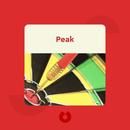Peak
Peak: Secrets from the New Science of Expertise
Your highlights:The images stored in long-term memory help people excel at a variety of complicated tasks.
Mental representations also play a role as a performance booster. We know it takes years of practice to become an expert in a field, whether driving a taxi or playing chess. Only through practice can you develop detailed representations of the situations or movements that matter to your performance.Let’s consider the sport of baseball. Plenty of fans have a handful of mental representations stored away, but they're nothing compared to those of professional baseball players. Because of all the practicing they do, professional players have developed sophisticated representations of all the potential trajectories of a baseball.
4 September, 2019 07:21 Share
Becoming a skilled performer means practicing purposefully, with set goals and constant feedback.
Do you think that a professional musician, athlete, scientist or entrepreneur developed their skills and talents overnight? It’s unlikely. Instead, they probably used purposeful practice to achieve success.This technique pushes you to build skills through several mechanisms, including setting clear, specific goals, being focused, leaving your comfort zone and receiving constant feedback.
4 September, 2019 07:22 Share
How did he achieve this? First, Steve had a clear and specific goal: to memorize more numbers than he could previously. Second, throughout the experiment, he remained focused.Steve also was pushed outside his comfort zone, as he was constantly encouraged to move past his current level of performance. If he managed to memorize 28 numbers in one session, for example, the trainer would start the new session by having him recite another string of the same length.
4 September, 2019 07:22 Share
And finally, Steve also received feedback on his performance, as the trainer would always inform him how he had done.This last mechanism is crucial. After all, how can you improve if there’s no one to tell you how you’re doing? Regardless whether you’re practicing sonatas or German grammar, it’s essential to know if you’re learning it correctly.Through purposeful practice, you can learn all manner of specialized skills. But purposeful practice is just a step toward a greater goal, which you’ll learn about in the next blink.
4 September, 2019 07:22 Share
Informed practice guided by expert knowledge separates good performances from stellar ones.
Now we know that purposeful practice is essential to becoming a great performer. But what sets apart great performers from people who seem to touch genius?They achieve this through deliberate practice, or purposeful practice that’s informed. For your practice to become deliberate, two things need to happen.First, the practice must be applied to a field that’s well-developed, meaning that there are already more experienced practitioners in the world whose level of performance clearly differs from those who are just starting out. Second, deliberate practice requires a teacher or coach who can train a student using the practice activities necessary to improve.
4 September, 2019 07:23 Share
In essence, deliberate practice must not only be based on a field with established experts but also involve guidance on how the student can become an expert. Thus you can take advantage of the specific techniques that teachers have used to achieve excellence to find excellence in your practice.By adopting a teacher’s knowledge, a student is given a template to follow, eliminating the need to start from scratch or waste time figuring out basic facts common to the field.For instance, let’s say you want to become a star high jumper. With a great coach, you won’t have to figure out things like the best place to start your jump, or how to achieve maximum distance.But let’s pause for a moment. If nearly any skill can be learned through intentionally guided practice, what does that say about the concept of talent?
4 September, 2019 07:24 Share
Contrary to public opinion, deliberate practice and not talent is the key to becoming extraordinary.
Yet there’s no evidence that innate talent exists. Rather, the incredible abilities of top performers, even a genius like Mozart, seem to be the result of deliberate practice.In fact, Mozart might not have accomplished that much when he was young. Evidence now suggests that the first compositions ascribed to him when he was eight years old match the handwriting of his father, Leopold Mozart, a composer who trained his son from a young age.
4 September, 2019 07:26 Share
The same holds for many other performers. Talented people don’t take shortcuts. They’ve all practiced deliberately for years, building their brains’ capacities by creating advanced mental representations.
4 September, 2019 07:26 Share
Final summary
Innate talent just doesn’t play much of a role in performance. Instead, the key to performing your best in whichever field you choose is to practice deliberately. By devoting yourself to a methodological training schedule, you can master almost any skill.
4 September, 2019 07:26 Share
About the book:
Peak (2016) is your guide to achieving expertise through regular practice. Counter to the general perception that natural ability plays a large part in determining performance, these blinks show you that just about anyone can acquire specialized skills if they practice hard and correctly.
About the author:
Anders Ericsson is a professor of psychology and Conradi Eminent Scholar at Florida State University. His work has been cited in bestselling books Moonwalking with Einstein and How Children Succeed.
Robert Pool is a science writer with a PhD in mathematics from Rice University. He has worked as a writer and editor for science magazines such as Nature and Science, among other publications.
Blinkist takes outstanding nonfiction books and distills their key insights into made-for-mobile book summaries that you can read in just 15 minutes. Learn something new every day - on your smartphone, tablet or PC.
blinkist.com